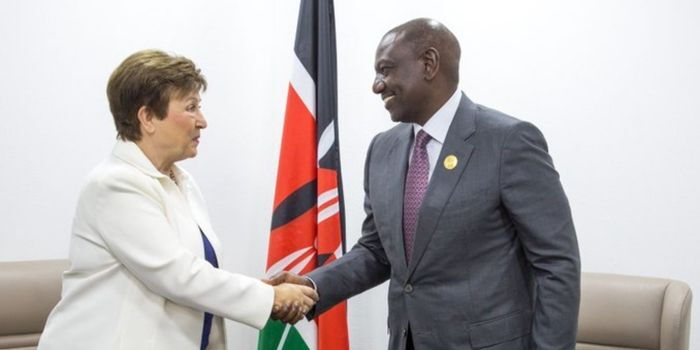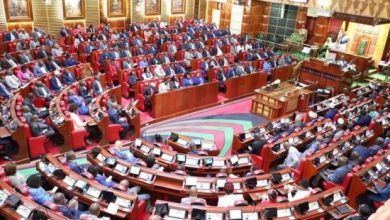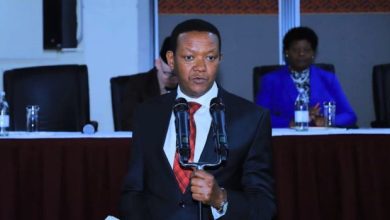IMF Sends Team to Review Ruto’s Budget Woes

Kenya is facing a crucial economic evaluation by the International Monetary Fund (IMF) as a delegation arrived in Nairobi to assess the country’s fiscal health and its ability to repay mounting debt. This comes after a recent court ruling upended planned tax measures, and President William Ruto’s government expanded its budget deficit to 4.3 per cent of GDP.
Why it matters: The IMF team’s visit comes at a sensitive time for Kenya. The government’s recent reversal of contentious tax proposals, following widespread protests that left over 60 people perished, has left a hole in its budget.
The delayed reforms have cast doubt over Kenya’s ability to meet the conditions tied to its $3.6 billion about Ksh464.4 billion in the current exchange rates, IMF financing programme.
Treasury projections estimate a revenue shortfall of Ksh 214 billion after the invalidation of taxes, including the doubling of VAT on fuel to 16 per cent. This has forced the Ruto administration to widen its fiscal deficit by 28 per cent, derailing earlier plans.
President William Ruto leading Kenya Kwanza delegation during a meeting IMF managing director Kristalina Georgieva, on Tuesday, November 8, 2022.
PCS
Dig deeper: The IMF’s review is key to unlocking a further $600 million in funding, which the Kenyan government is counting on to stabilise the economy. However, the fund’s decision will depend on its assessment of the impact of the scrapped tax measures, as well as the government’s revised fiscal outlook.
Kenya has long been viewed as one of Africa’s economic powerhouses, but recent fiscal challenges have cast a shadow over its stability. With public debt now at unsustainable levels, and three major credit-rating agencies downgrading Kenya’s debt status deeper into junk territory, the country faces significant external and internal financial pressures.
The IMF is particularly concerned about Kenya’s rising debt vulnerability. The country’s debt situation has reached critical levels, and reducing the accumulation of new debt remains one of the IMF’s top priorities for the ongoing program. The current economic evaluation is not only focused on Kenya’s immediate fiscal challenges but also on ensuring long-term debt sustainability.
The government’s decision to backtrack on tax reforms intended to raise Ksh 372 billion ($2.7 billion) has placed more strain on its finances. The IMF wants to ensure that Kenya can strike a balance between necessary public spending and responsible fiscal management.
Kenya, like many African nations, is caught in a balancing act. On one side, the country faces urgent needs to invest in critical sectors such as health and education. On the other, it must manage its soaring debt levels, which risk spiralling out of control.
IMF spokesperson Julie Kozack highlighted the challenges, stating that policymakers across the region, including in Kenya, are grappling with difficult decisions. “The goal of the program is to help establish sound macroeconomic fundamentals, which we see as crucial for fostering sustainable and inclusive growth, as well as for generating jobs, especially for young Kenyans.”
Reaction of Kenyans: The IMF’s program has not been without controversy. Protests against the government’s tax proposals were also fuelled by public anger over allegations of fraud and mismanagement of public funds. Critics argue that the IMF’s economic conditions often place undue pressure on struggling economies, exacerbating public dissatisfaction.
The IMF is aware of these concerns and is working closely with Kenyan authorities to ensure that any measures are implemented with transparency and public consultation. Kozack emphasised the importance of governance reforms within the IMF program, noting that initiatives to improve transparency and ensure the responsible use of public funds are essential to restoring trust.
What next: The IMF’s evaluation will play a critical role in determining Kenya’s economic trajectory. If the fund approves the disbursement of the next tranche of funding, it could offer the Ruto administration some much-needed breathing room.
However, failure to meet the IMF’s conditions could deepen Kenya’s fiscal woes and push the country further towards economic instability.
The outcome of the IMF’s visit will have far-reaching consequences for Kenya’s ability to manage its public finances, attract foreign investment, and provide essential services to its citizens.
As the delegation conducts its assessment, the government is under immense pressure to demonstrate its commitment to sound economic management while also addressing public concerns over governance and fraud.
President William Ruto (left) speaking with IMF managing director Kristalina Georgieva in Italy on January 29, 2024
PCS



